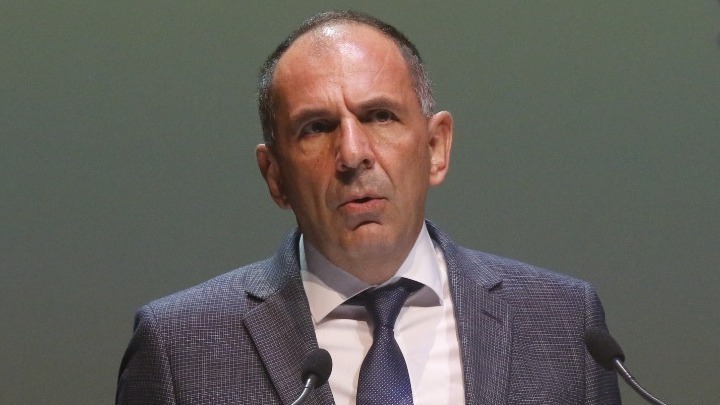FM Gerapetritis: Mitsotakis-Trump meeting will take place in due course

Greece "has an excellent relationship with the new U.S. administration," stated Foreign Minister George Gerapetritis in an interview with radio Parapolitika on Thursday. He also noted that there will be a meeting between the Greek Prime Minister Kyriakos Mitsotakis and U.S. President Donald Trump "in due course", while at the moment the two sides are at a stage where they are having multiple consultations on various issues.
As Gerapetritis pointed out, he was among the first officials who met the new US Secretary of State Marco Rubio at the State Department for "an extremely productive discussion," while they also had another meeting in Brussels.
"We have developed a consistently good relationship, there are channels of communication and, above all, there is a serious understanding, a serious relationship, which goes back - not only to the past and the relationship that has developed between the two leaders under President Trump's first term - but mainly to the strategic defence relationship that has developed between Greece and the United States and, above all, due to the common interests that exist to a great extent," he said.
Gerapetritis stressed that "Greece is currently within the inner core of the European Union and is taking critical initiatives for transatlantic relations on the other side as well. It is on the United Nations Security Council, helping shape global policy, which in itself is a very powerful factor that would make anybody want to have our country close to them."
"The relationship has already been built during the first term of the American President. I think this will be confirmed when there will be the second meeting," said the minister. He pointed out that the channels had been cultivated even before the US elections.
"At the present stage of diplomatic history, predictability of developments is an absolute impossibility. International multilateralism has become extremely unpredictable. What a prudent foreign policy ought to do is to work out all possible scenarios. And this we have done in good time. And I think it is being demonstrated in practice," he said.
The foreign minister noted that "the relationship that may exist between the US President or the new US Administration and Turkiye is a reality," while adding that many things have changed as regards local regional balances since Trump's first term.
"Two great wars have arisen, which are rocking our wider region. They are changing the situation. The value that is constant is that which is based on steady governance, based on principles, based on international law and, above all, a foreign policy which widens its footprint," he noted.
Gerapetritis said that in six years, the Mitsotakis government has succeeded and has brought important strategic cooperation agreements.
"We have increased our regional power. We are, perhaps, the only country that maintains a strategic relationship with Israel, but also excellent relations with the entire Arab world. We have strategic alliances, beyond the United States, with France and other powers....this multiplies our power," he said.
Regarding the laying of a submarine power cable for the electricity interconnection of Greece and Cyprus, he expressed confidence that it will go ahead, while recalling that it is project jointly funded by the EU, "which is protected under international law, in the sense that this surveying and cable-laying is unrestricted, it does not require a permit".
"The timing is multifactorial. It doesn't just depend on the company's planning, which has to be done. It also depends on the technical details, which determine the issue of going out to survey and lay cable, because there is also the need to issue the necessary NAVTEX."
"We strongly and seriously support our sovereign rights," the minister said. "We have already done so in the case of the award of Chevron and Exxon, two global energy giants. We will also do so in relation to the maritime spatial plans, which have long been overdue. Greece will move forward without any fears whatsoever," he added.
Gerapetritis underlined that the Greece-Turkiye High-level Cooperation Council will be held this year, adding that Greek-Turkish dialogue, which has brought significant results in cases of violations, migration and in the issue of Cyprus, is continuing as normal.
"The difference this time round is that this dialogue is structured and continuous. The major pillars of the dialogue, which are the Political Dialogue, the Confidence Building Measures and the Positive Agenda, are continuing as usual."
"The High-level Cooperation Council, which will be held in Ankara, will take place. No specific time was ever planned. It will take place when the schedules of the two leaders allow it and it is decided that the time is right. However, the dialogue has not been frozen, it is continuing normally and the meeting of the two leaders will take place this year," he said.
Regarding the government's decision to place Turkiye on the national list of safe third countries, he noted that it was reissued after a decision of the Council of State, so that its reasoning was more complete.
"Turkiye is a safe country for third-country citizens who are on its territory, for example Syrian citizens. In other words, it is not an overall assessment of whether Turkiye is a country that applies a rights policy horizontally or whether it is a country that adopts the core charters of rights," he said.
This, he explained, has a practical consequence, in the sense that if the country is declared safe for the citizens of these third countries, it is possible for them to return there if it is found that the conditions for granting asylum are not met.
"So, it is an issue that is purely about migration and purely about any returns that will take place if asylum is not granted," he concluded.

